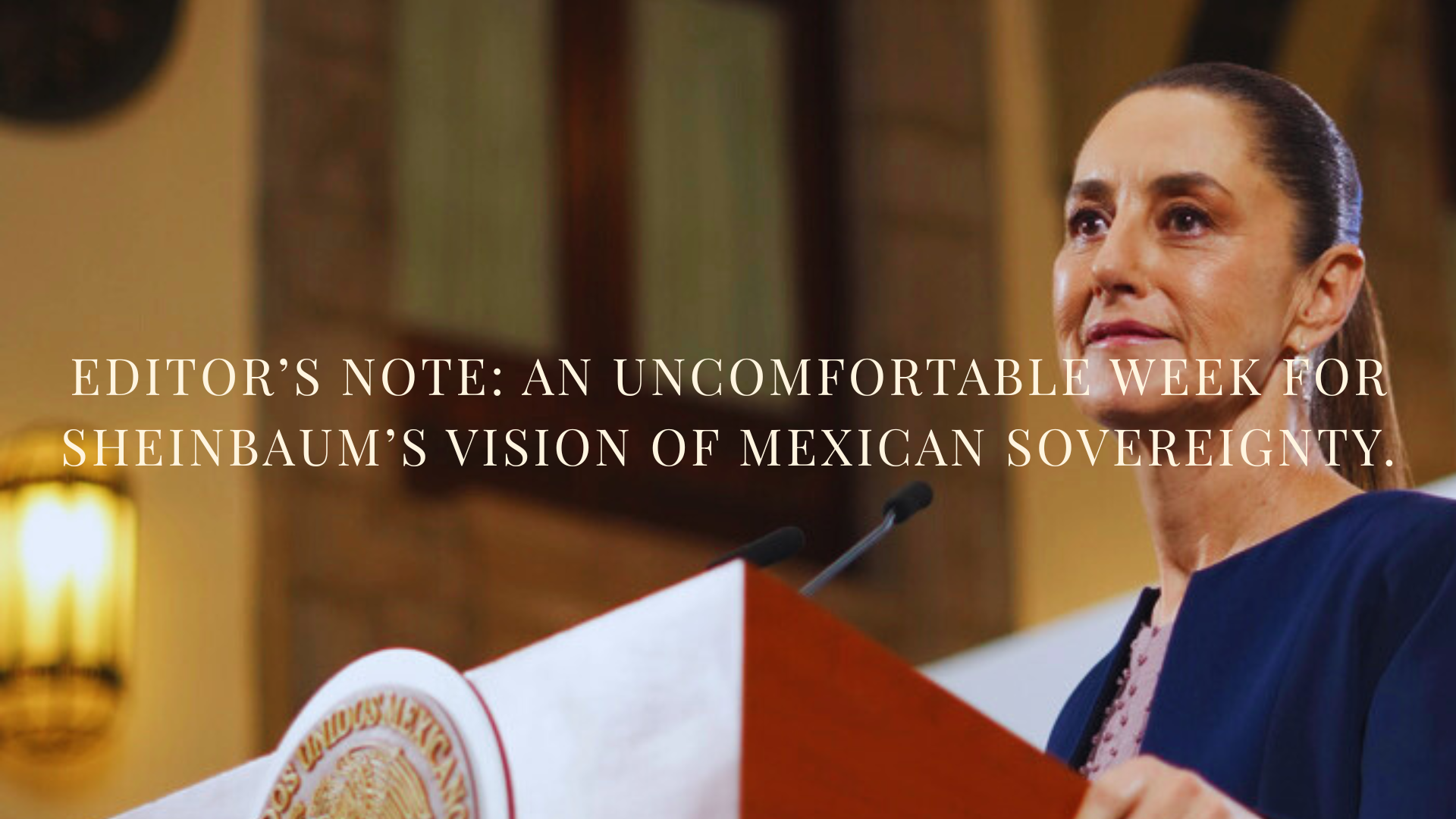
Editor’s note: An uncomfortable week for Sheinbaum’s vision of Mexican sovereignty
by Andrew Law, editor and founder.
This week a video circulated on social media of former Mexican president Felipe Calderón decrying the country’s freshly implemented judicial reform at Georgetown University in Washington, DC.
In it, Calderón called MORENA’s reform a “demolition project” that had likely rendered free elections a thing of the past. What seemed to irritate President Claudia Sheinbaum most, however, was Calderón’s suggestion that former US ambassador Ken Salazar should have intervened. Sheinbaum did not hold back at her morning press conference: “It's outrageous, there's no other word for it. He goes to the United States to say that the American ambassador should have intervened to prevent the judicial reform from passing. Aside from being spurious, he's a traitor.”
Sheinbaum rarely misses a chance to stress Mexico’s sovereignty in her dealings with Washington. When Secretary of State Marco Rubio visited last week to highlight security cooperation, the first line of the joint statement stressed respect for sovereignty, echoing…

Mexico’s government is using the disappeared to build a surveillance state, families say
by Madeleine Wattenbarger.
A polemical point of the reform to the General Disappearance Law passed by Mexican legislators this week is the use of a biometric CURP to search for missing people. The reform is part of a broad legislative package that includes a reform to the General Population Law, which establishes the use of a CURP with fingerprints and a photograph as an identification document obligatory for access to public and private services. The data will go into a Unified Identity Platform (PUI, by its initials in Spanish), which will, in theory, permit the authorities to locate missing people by their CURP.
A previous iteration of the biometric CURP proposal was backed by the World Bank, and similar initiatives were proposed by Felipe Calderón, Enrique Peña Nieto and former Secretary of the Interior Olga Sanchez Cordero. The reform comes out of a proposal presented by Claudia Sheinbaum on March 27, after disappearances in Mexico were thrown into the spotlight: search collectives found a ranch in Teuchitlán, Jalisco, where victims of forced recruitment were held, and the United Nations Committee on Forced Disappearance gave the official assessment that systematic state disappearances exist in Mexico.
After Sheinbaum presented the reform to the General Disappearance Law, the government held a series of feedback sessions with search collectives and victims’ families. Some of the families’ proposals appear in the revised law passed by the Senate. It will incorporate…

Crony capitalism
by Macario Schettino.
In the 20th century, the Mexican economy - like the rest of Latin America - chose a policy known as Import Substitution Industrialization. The goal was to produce in Mexico what would be consumed domestically, and to achieve that, tariffs were imposed on imported goods. In theory, infant industries would be able to survive, become competitive, and tariffs could then be eliminated. The opposite happened: tariffs had to be increased because domestic industry never became competitive. Eventually, the economy was completely closed off and suffered its worst peacetime crisis in 1982.
In 1986, an attempt was made to reverse course. Mexico joined the GATT, implemented an anti-inflationary plan, renegotiated its external debt, and even signed a trade agreement with the United States and Canada. After a deep but brief crisis, the benefits of NAFTA became evident. In the final years of the 20th century, Mexico grew at rates it hadn’t seen in decades.
In 2001, China joined the WTO (GATT’s successor), and the dot-com recession hit the United States. This derailed the Mexican economy, which was unable to resume strong growth, instead remaining at an average annual rate of around 2%. During those years, many studies - by Mexican and foreign academics, agencies, and institutions - tried to identify the reasons why Mexico could not grow faster.

Felipe Calderón: Sheinbaum must confront the cartels before they completely capture Mexico
In an exclusive interview with The Mexico Brief’s editor, Andrew Law, former President Felipe Calderón rejects the “drug war” label, expresses support for Claudia Sheinbaum’s stance toward cartels, praises her anti-nepotism efforts, and argues US cooperation is crucial - even under Trump - while expressing hope for Mexico’s future.

